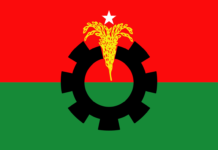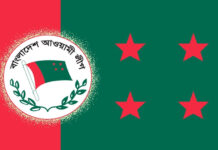Gibson, Duncan say it is a matter for court, not a political decision

- A meeting was held between Prime Minister Sheikh Hasina and visiting British Minister of State for International Development Alan Duncan
British High Commissioner in Dhaka Robert Gibson yesterday said the extradition treaty between Bangladesh and the United Kingdom could be used to bring back BNP leader Tarique Rahman from England.
“This is a long-standing policy of the British government that we cannot and will not comment on the individual status of people who are residents in the United Kingdom,” Gibson told at a press briefing in the city yesterday.
“There is an extradition treaty between the United Kingdom and Bangladesh which is available for use,” Gibson said, when asked about the status of Tarique and if the UK will support any move by Bangladesh government to bring him back.
Replying the same question, visiting British Minister of State for International Development Alan Duncan said: “In the United Kingdom, it is entirely a matter of court and it has nothing to do with politicians. It is not for me or any minister to decide on this whole thing…This is not a political decision.”
BNP chief Khaleda Zia’s son Tarique Rahman, also the senior vice-chairman of the party, has been in London since September 11, 2008, on medical grounds after getting parole in various cases.
He faces 14 charges, of which four, including the August 21 grenade attack case, are in trial and 10 are stayed.
Duncan avoided a direct question about Bangladesh State Minister for Foreign Affairs Shahriar Alam’s remark that the British delegation had expressed surprise over Tarique’s recent comment that his father Ziaur Rahman was the first president of Bangladesh.
“It is not for me in any way to reinterpret Bangladesh history. I think you all are very clever people and you all know the history of Bangladesh,” he said.
Asked why Gibson thanked Bangladesh for abstaining from voting on Crimea at the UNGA, the British high commissioner said: “I understood the decision of Bangladesh government as they explained to me and I was grateful that they did not oppose the resolution…I accepted the fact that they thought they could not support the resolution and that is their decision based on their long-term foreign policy.”
About the present political situation, Duncan said the last election was unusual.
“I respect this country’s political system and the result of the election. The election was of course unusual because one side did not contest,” he said, adding that despite being unusual in that sense, the election was legitimate.
The British government wants an enlightened government for the good of the people. “When I see her [Prime Minister Sheikh Hasina] I will urge her to look ahead and ask herself where she wants her Bangladesh in five or 10 years’ time,” Duncan said in the press conference before his meeting with the prime minister.
When asked about his assessment on the Bangladesh readymade garment sector in the post-Rana Plaza situation, he said the big problem was that the size of the garment industry had grown far more than the regulation needed to govern its standard.
“This year has to be the year in which standard in the readymade garment sector catch up with the growth of the sector over the last 25 years,” he said.
Source: Dhaka Tribune









